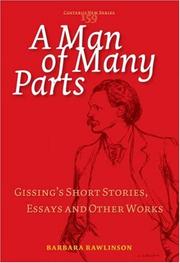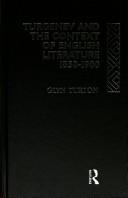| Listing 1 - 5 of 5 |
Sort by
|

ISBN: 9042020857 9789042020856 9401203482 1429456205 9781429456203 9789401203487 Year: 2006 Publisher: Amsterdam New York Rodopi
Abstract | Keywords | Export | Availability | Bookmark
 Loading...
Loading...Choose an application
- Reference Manager
- EndNote
- RefWorks (Direct export to RefWorks)
This comprehensive study of George Gissing's short stories and related non-fiction is essential reading for students of nineteenth-century realism. For the first time readers will be able to follow the development which transformed Gissing's unremarkable early stories into the very individual tales that elevated his work to the vanguard of realistic short fiction. Gissing's American period is notable for its accumulation of themes that were repeatedly refined and adapted for his later work, causality emerging as the dominant voice. On his return to England, shifting political and philosophical beliefs expressed in his non-fiction had a vital impact on his second phase of short fiction, and the part played by realism in the author's short stories and his writings on Charles Dickens added further dimensions to his work as a whole. By the final phase of Gissing's remarkable development, it is evident that his interest in the concept of causality as the major force in his short work had been replaced by a more challenging preoccupation with the human psyche. This introduced philosophical, sociological and psychological dimensions to Gissing's work that established him in the field of short fiction as a leading exponent of late nineteenth-century realism.
Book
ISBN: 0415572797 0415573157 1136999566 9786612974083 1136999574 1282974084 0203855728 9780203855720 9781136999574 9781282974081 6612974087 9781136999567 Year: 2010 Publisher: Abingdon, Oxon New York Routledge
Abstract | Keywords | Export | Availability | Bookmark
 Loading...
Loading...Choose an application
- Reference Manager
- EndNote
- RefWorks (Direct export to RefWorks)
The spectacular development of early consumer society in Britain, France and the United States had a profound impact on constructions of femininity and masculinity, and commercial and cultural values in the late nineteenth and early twentieth centuries. Focusing on novels by Theodore Dreiser, George Gissing and Emile Zola, Just Looking, first published in 1985, addresses itself to a central paradox of the period: the perceived antithesis of the terms ""commerce"" and ""culture"" which emerged at a time which saw the actual drawing together of commercial and cultural practices.<
Fiction --- Naturalism in literature. --- Consumption (Economics) in literature. --- History and criticism. --- Dreiser, Theodore, --- Gissing, George, --- Zola, Émile, --- Political and social views. --- Cholla, --- Emilisōlā, --- Jolla, --- Sōlā, Emili, --- Tso-la, --- Tso, La, --- Zola, --- Zola, Emil, --- Zola, Émile Édouard Charles Antoine, --- Zola, Emilio, --- Zolah, Emil, --- Zoli︠a︡, Ėmilʹ, --- Zuo, La, --- Zuola, --- Золя, Эмиль, --- זאלא, עמיל --- זאלא, עמיל, --- זאליא, ע. --- זאליא, עמיל --- זולא, אמיל, --- זולא, עמיל --- זולה, אמיל --- זולה, אמיל, --- Gissing, George Robert, --- گيسينگ، جورج --- Dreiser, Theodore --- Zola, Emile,
Book
ISBN: 9781107691230 9780521197380 0521197384 9780511762406 9780511776410 0511776411 0511762402 0511850255 1107205263 1282723383 9786612723384 0511775652 0511773838 0511772769 0511774893 1107691230 Year: 2010 Publisher: Cambridge [etc.] Cambridge University Press
Abstract | Keywords | Export | Availability | Bookmark
 Loading...
Loading...Choose an application
- Reference Manager
- EndNote
- RefWorks (Direct export to RefWorks)
As nineteenth-century realism became more and more intrepid in its pursuit of describing and depicting everyday life, it blurred irrevocably into the caustic and severe mode of literature better named satire. Realism's task of portraying the human became indistinguishable from satire's directive to castigate the human. Introducing an entirely new way of thinking about realism and the Victorian novel, Aaron Matz refers to the fusion of realism and satire as 'satirical realism': it is a mode in which our shared folly and error are so entrenched in everyday life, and so unchanging, that they need no embellishment when rendered in fiction. Focusing on the novels of Eliot, Hardy, Gissing, and Conrad, and the theater of Ibsen, Matz argues that it was the transformation of Victorian realism into satire that granted it immense moral authority, but that led ultimately to its demise.
English fiction --- Realism in literature. --- Satire --- Satire, English --- History and criticism. --- English satire --- English wit and humor --- Neorealism (Literature) --- Magic realism (Literature) --- Mimesis in literature --- Eliot, George, --- Hardy, Thomas, --- Gissing, George, --- Conrad, Joseph, --- Ibsen, Henrik, --- Criticism and interpretation. --- Appreciation --- イプセン, ヘンリック --- Korzeniowski, Józef Konrad Teodor, --- Korzeniowski, Joseph Conrad Theodore, --- Konrad, Dzhozef, --- Kʻang-la-te, --- Conrad-Korzeniowski, Joseph, --- Korzeniowski, Joseph Conrad-, --- Kʻonradŭ, Josep, --- Kʻonradŭ, Chosep, --- Kʻolladŭ, Josep, --- Konrad, Dzd. --- Conrad, Józef, --- קונראד, ג׳וזף, --- קונראד, ג׳וסף --- קונרד, ג׳וזף --- קונרד, ג׳וזף, --- קונרד, יוסף --- 康拉德, --- Konrad Nalecz Korzeniowsky, Jozef Tedor, --- Konrant, Tzozeph, --- Author of Desperate remedies, --- Author of Under the greenwood tree, --- Desperate remedies, Author of, --- Gardi, Tomas, --- Ha-tai, --- Ha-tai, Tʻo-ma-ssu, --- Hārdī, Tūmās, --- Hardy, Tomás, --- Hardy, Tomasz, --- Khardi, Tomas, --- Under the greenwood tree, Author of, --- 哈代托瑪斯, --- Gissing, George Robert, --- گيسينگ، جورج --- Cross, Marian Evans, --- Evans, Marian, --- Eliot, Džordž, --- Ėliot, Dzhordzh, --- Cross, Mary Ann, --- Lewes, M. E. --- Lewes, Marian Evans, --- Elliŏtʻū, Choji, --- Eliyaṭ, Jārj, --- Evans, Mary Anne, --- אליוט, ג׳ַַורג׳ --- אליוט, ג׳ורג׳, --- עליאט, דזשארדזש --- עליאט, דזשארדזש, --- עליוט ג׳יארג׳, --- עליוט, גי׳ארג׳, --- עליוט, ג׳רארג׳, --- Arts and Humanities --- Literature --- Hārḍī, Thômasa,
Book
ISBN: 0773420487 9780773420489 9780773439139 0773439137 Year: 2011 Publisher: Lewiston, N.Y. Edwin Mellen Press
Abstract | Keywords | Export | Availability | Bookmark
 Loading...
Loading...Choose an application
- Reference Manager
- EndNote
- RefWorks (Direct export to RefWorks)
In How the Writings of William Morris Shaped the Literary Style of Tennyson, Swinburne, Gissing, and Yeats; Barthesian Re-Writings Based on the Pleasure of Distorting Repetition she succeeds in combining a clear interpretative line with a cogent methodology .In particular, she is most successful in her deployment of the theories of Roland Barthes which are never transformed into a superimposed discourse on the hermeneutic procedures adopted. In the course of her close reading of William Morris's poetic and narrative texts she identifies a dialogic parallelism with those authors who recognized
Authors and readers -- Great Britain -- History -- 19th century. --- Gissing, George, -- 1857-1903 -- Criticism and interpretation. --- Imitation in literature. --- Morris, William, -- 1834-1896 -- Contemporaries. --- Morris, William, -- 1834-1896 -- Influence. --- Swinburne, Algernon Charles, -- 1837-1909 -- Criticism and interpretation. --- Tennyson, Alfred Tennyson, -- Baron, -- 1809-1892 -- Criticism and interpretation. --- Yeats, W. B. -- (William Butler), -- 1865-1939 -- Criticism and interpretation. --- Imitation in literature --- Authors and readers --- English --- Languages & Literatures --- English Literature --- Readers and authors --- Authorship --- Quotation --- Literary style --- Mimesis in literature --- Originality in literature --- Plagiarism --- History --- Morris, William, --- Tennyson, Alfred Tennyson, --- Swinburne, Algernon Charles, --- Gissing, George, --- Yeats, W. B. --- Influence. --- Contemporaries. --- Criticism and interpretation. --- Gissing, George Robert, --- گيسينگ، جورج --- Morisu, Wiriamu, --- Morris, Uilʹi︠a︡m, --- Morris, William M., --- Moris, V., --- Морис, В., --- Yeats, William Butler --- D. E. D. I., --- Daemon Est Deus Inversus, --- Ganconagh, --- I., D. E. D., --- Йейтс, У. Б. --- Ĭeĭts, U. B. --- Йейтс, Уильям Батлер, --- Ĭeĭts, Uilʹi︠a︡m Batler, --- Weilian Batele Yezhi, --- Yeṭs, Ṿilyam Baṭler, --- יטס, יטלאם בטלר --- ייטס, ויליאם בטלר, --- 威廉,巴特勒,叶芝, --- Tennyson, Alfred --- Alfred

ISBN: 0203310225 1134900317 1280323248 9786610323241 0203221923 9780203310229 0415077427 0415755972 1134900309 Year: 2002 Publisher: London New York Routledge
Abstract | Keywords | Export | Availability | Bookmark
 Loading...
Loading...Choose an application
- Reference Manager
- EndNote
- RefWorks (Direct export to RefWorks)
Turgenev and the Context of English Literature examines the cultural outlook in the Anglo-Saxon world in the second half of the nineteenth century by looking at the reception of Turgenev's work during the period. By analysing the timing and quality of the contemporary English translations of Turgenev's work, and his influence on the work of a number of writers including Henry James and George Gissing, Glyn Turton charts the development of contemporary cultural and moral attitudes.
Russian fiction --- Russian literature --- Appreciation --- Turgenev, Ivan Sergeevich, --- James, Henry, --- Gissing, George, --- Gissing, George Robert, --- گيسينگ، جورج --- Dzheĭms, G. --- Dzheĭms, Genri, --- Jeimsŭ, Henri, --- Джеймс, Генри, --- ג׳יימס, הנרי, --- ג׳ײמס, הנרי, --- Τζειος, Χενρι, --- جميس، هينري، --- جيمز، هنرى --- Ṭarjan̲īv, Aivān̲, --- Toergenjew, Iwan, --- Tourghenieff, Ivan, --- Tourguéneff, Ivan, --- Tourguénev, Ivan, --- Tourguéniev, --- Tourguéniev, Ivan, --- Tourguényev, Ivan Szergeevics, --- Tʻu-ko-nieh-fu, --- Tuó̂cghênhép, Ivan, --- Turgenef, Ivan Sergheïevitch, --- Turgenev, I. S. --- Turgenev, Ivan, --- Turgéněv, J. S., --- Turgénieff, Ivan S., --- Turgenjeff, Iwan, --- Turgenjev, --- Turgenjew, Iwan, --- Turgenuvha, --- Turgenyev, --- Turgieniew, Iwan, --- Turguenef, Iván, --- Turguéniev, Iván, --- Turheni︠e︡v, I. S., --- Тургенев, Иван Сергеевич, --- טורגניב, א. ס. --- טורגניב, א. ס., --- טורגניב, איב --- טורגניב, איוואן סרגיביץ׳, --- טורגניב, איוון, --- טורגניב, י. --- טורגניב, י.ס --- טורגניוב, איבן --- טורגנייב --- טורגנייב, א. ס., --- טורגנייב, איוואן סרגיביץ׳, --- טורגענעװ, אי. ס. --- טורגעניעף, איוואן --- טורגעניעף, י. --- טורגעניעװ, א., --- טורגעניעװ, א. ס. --- טורגעניעװ, איװאן, --- טורגעניעװ, י. ס. --- טורגעניעוו, א. ס., --- טורגעניעוו, אי. ס., --- טורגעניעוו, איוו. סערג., --- טורגעניעוו, איוואן --- טורגעניעוו, י.ס --- טורגעניעוו, י. ס., --- טורגיענעוו, א. ס. --- I. S. ツルゲーネフ, --- Turgheniev, I. S., --- Tūrginīf, Īvān Sirgiyivīch, --- Tūrginīf, Īvān Sirgīvīch, --- تورگنيف، ايوان سرگيويچ --- Influence. --- Appreciation. --- Knowledge --- Literature. --- Great Britain --- United States --- Intellectual life --- Turgenev, Ivan Sergeevich --- James, Henry
| Listing 1 - 5 of 5 |
Sort by
|

 Search
Search Feedback
Feedback About UniCat
About UniCat  Help
Help News
News